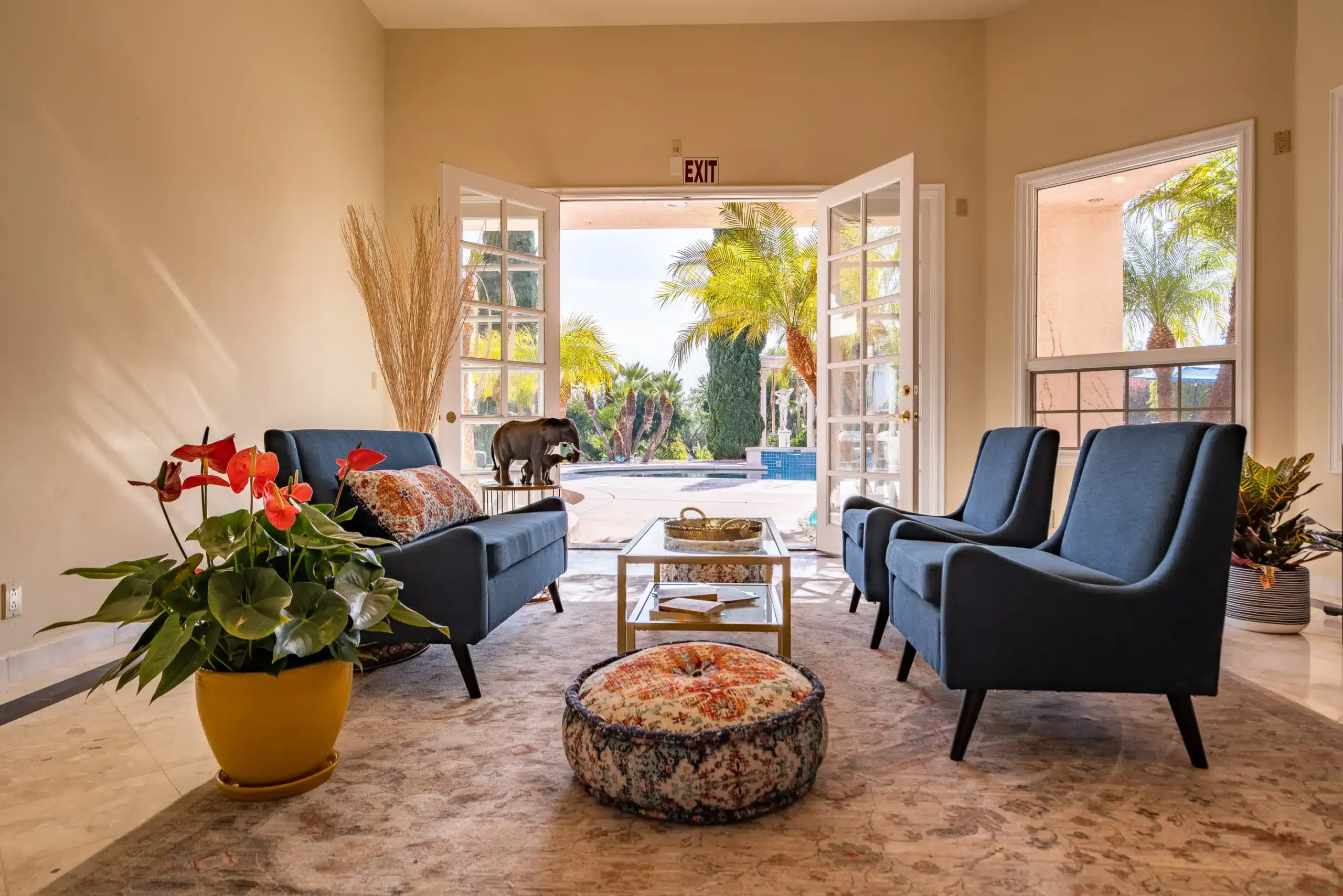What is Benzo Belly?
Substance abuse, a multifaceted challenge, impacts not only mental and emotional well-being but also manifests in physical symptoms, one of which is the often-overlooked “benzo belly.” This condition is particularly prevalent among individuals experiencing benzodiazepine withdrawal or those in the throes of benzodiazepine addiction. In fact, data from the National Survey on Drug Use and Health between 2015 and 2019 indicated that approximately 2% of the U.S. population had misused benzodiazepines in the past year, highlighting the widespread nature of this issue.
At Villa Oasis, a leading residential inpatient facility specializing in addiction treatment, we recognize the complexities of substance abuse, including the intricate relationship between benzodiazepine use and physical health. Addressing “benzo belly” is a critical component of our comprehensive treatment strategy, especially during the delicate phases of medical detox and acute withdrawal.
Our holistic approach extends beyond treating benzodiazepine withdrawal symptoms. We focus on the entirety of the individual’s experience, understanding that conditions like “benzo belly” are not just a side effect of benzo addiction or withdrawal but are intertwined with the overall journey towards recovery. In our serene setting, we offer personalized treatment plans. These plans are meticulously designed to manage the symptoms of “benzo belly,” facilitate safe and effective benzodiazepine detox, and provide the necessary support during protracted withdrawal phases. The goal at Villa Oasis is not only to treat the addiction but also to ensure a comprehensive healing process, addressing both the psychological and physical aspects of substance abuse.

What Exactly is Benzo Belly?
“Benzo belly” is a term specifically used to define a range of gastrointestinal symptoms that are frequently observed in individuals undergoing benzodiazepine withdrawal or those struggling with benzodiazepine addiction. Benzodiazepines, commonly prescribed for managing conditions such as anxiety disorders and insomnia, can lead to physical dependence. Notably, a study conducted in Catalonia, Spain, from March 2020 to December 2021, found that the COVID-19 pandemic has been linked to an increase in benzodiazepine prescriptions. This suggests a potential rise in benzodiazepine-related issues, including “benzo belly,” during and following the pandemic.
When individuals reduce or discontinue their use, especially after long-term benzodiazepine use, they may experience “benzo belly” as part of the withdrawal symptoms. The symptoms of “benzo belly” encompass more than just abdominal pain; they include bloating, gastrointestinal discomfort, and other digestive irregularities. These issues are not only physically troubling but also significantly impact the recovery process from benzodiazepine addiction. It’s a manifestation that intertwines the physical and psychological aspects of addiction treatment.
In addressing “benzo belly,” it’s crucial to understand its role in the broader context of benzodiazepine detox. As part of the medical detox process at facilities like Villa Oasis, managing “benzo belly” is essential in ensuring a smoother transition through the acute and protracted withdrawal phases. Our approach is comprehensive, targeting both the benzodiazepine withdrawal symptoms and the overarching treatment for benzodiazepine addiction, thereby fostering a more holistic recovery journey.
Causes of Benzo Belly
The emergence of “benzo belly” is attributed to a complex interplay of factors related to benzodiazepine use and the subsequent withdrawal process. Primarily, prolonged benzodiazepine use is known to disturb the natural equilibrium of gut flora, a critical aspect of gastrointestinal health. This disruption often results in the gastrointestinal symptoms collectively termed as “benzo belly.”
When an individual begins the process of benzodiazepine detox, particularly after long-term benzodiazepine addiction, these symptoms can intensify. This exacerbation is a common characteristic of benzodiazepine withdrawal symptoms, making it a notable concern in addiction treatment. The physical dependence on benzodiazepines, developed over time, plays a significant role in the manifestation of “benzo belly.”
Understanding the dynamics of benzodiazepine addiction and withdrawal, including the onset of symptoms like “benzo belly,” necessitates a broader comprehension of the distinctions and interactions within the scope of barbiturates vs benzodiazepines. This knowledge underscores the importance of specialized treatment approaches for each class of medication, tailored to address specific withdrawal symptoms and support recovery.
The journey through benzodiazepine withdrawal, especially during the acute withdrawal phase, can be challenging due to these gastrointestinal disturbances. At Villa Oasis, our approach to treating “benzo belly” includes strategies to mitigate the impact of these symptoms on the overall recovery process. Recognizing and addressing these issues is crucial in facilitating a smoother transition through the protracted withdrawal phase and towards complete recovery from benzodiazepine addiction.
The Gut-Brain Connection
The gut-brain connection refers to the constant communication between the brain and the digestive system, known as the gut-brain axis. This system of nerves and chemical messengers helps explain why emotional and mental stress can lead to physical symptoms in the gut—especially during benzodiazepine withdrawal.
When someone stops using benzodiazepines, GABA levels drop, disrupting both brain function and gut regulation. This imbalance often contributes to symptoms like bloating, cramping, and discomfort, commonly referred to as benzo belly. Because GABA also plays a role in gut health, its reduction can trigger heightened sensitivity in the digestive tract.
Understanding this link highlights why withdrawal affects both the mind and body. At Villa Oasis, we recognize the impact of the gut-brain axis and support our clients through targeted care that addresses both the physical and emotional symptoms of withdrawal.
Symptoms and Impact
The manifestation of “benzo belly,” a common issue during benzodiazepine withdrawal, varies significantly among individuals, with symptoms ranging from mild discomfort to severe pain. For those seeking information on how to manage these challenging symptoms, understanding what helps with benzo withdrawal is essential. Effective management strategies are key to alleviating discomfort and aiding in the recovery process. This condition, often seen in those undergoing benzodiazepine detox or grappling with benzodiazepine addiction, includes several telltale symptoms:
- Bloating and gas
- Abdominal pain
- Nausea and vomiting
- Diarrhea or constipation
- Changes in appetite
- Weight fluctuations
These symptoms not only signify the body’s response to the cessation of benzodiazepine use but also reflect the complexities of physical dependence on these substances. They can markedly impact the quality of life, complicating the journey towards recovery from benzodiazepine addiction.
In the context of addiction treatment, especially during the acute and protracted withdrawal phases, understanding and effectively managing these symptoms is crucial. This understanding becomes even more important considering the prevalence of benzodiazepine prescriptions. For instance, it’s been observed that for every 100 adult visits to an office-based doctor over the course of a year, 27 visits result in a prescription for a benzodiazepine. This statistic highlights the widespread use of these drugs and underscores the potential for a significant number of individuals to experience “benzo belly” during withdrawal.
While managing the discomforting symptoms of ‘benzo belly’ is a critical aspect of the withdrawal process, individuals and healthcare providers alike seek effective and safe treatment alternatives to benzodiazepines. A frequently asked question in this regard: is gabapentin a benzo? Clarifying that Gabapentin is not a benzodiazepine but rather a medication that can aid in the management of withdrawal symptoms, including those of ‘benzo belly,’ without contributing to benzodiazepine dependency is vital. This knowledge empowers patients and clinicians to consider Gabapentin as part of a comprehensive withdrawal management plan, alongside other supportive measures, to alleviate the physical symptoms of benzodiazepine cessation. At Villa Oasis, incorporating such alternatives into our treatment approach allows us to address the multifaceted challenges of recovery, ensuring a smoother, more comfortable transition toward healing.
At Villa Oasis, we prioritize alleviating these symptoms as part of our holistic strategy to address both the psychological and physical aspects of substance abuse, ensuring a more comfortable and successful recovery journey. For those wondering how long does Klonopin stay in your system, we provide comprehensive education and support to help individuals navigate the detox process with confidence and care.

Understanding Benzodiazepine Withdrawal
Withdrawal from benzodiazepines can be a complex and physically taxing process, particularly for individuals who have been using these medications for an extended period. As the body adjusts to functioning without the drug, a wide range of withdrawal symptoms can emerge—both physical and psychological. Common physical symptoms include abdominal pain, constipation, nausea, and headaches, while psychological effects may include anxiety, irritability, insomnia, and difficulty concentrating.
One of the more distressing physical symptoms associated with this process is known as benzo belly. This term refers to the gastrointestinal discomfort that can occur during withdrawal, often characterized by bloating, cramping, indigestion, and changes in bowel habits. These symptoms are believed to be linked to the disruption of the body’s GABA system, which plays a vital role in regulating digestion and nervous system function. When benzodiazepine use is discontinued, the sudden drop in GABA activity can cause the gut to become overly sensitive, leading to pain and discomfort commonly associated with benzo belly.
Withdrawal symptoms can begin as soon as 2 to 24 hours after stopping benzodiazepine use, depending on the specific medication, dosage, and duration of use. The severity and duration of symptoms also vary widely based on individual factors, including metabolism, co-occurring mental health conditions, and whether withdrawal is being managed professionally.
To reduce the intensity of symptoms and lower the risk of complications, medical professionals strongly recommend a gradual tapering process under clinical supervision. This approach helps the brain and body slowly adjust to the absence of benzodiazepines, minimizing withdrawal effects like benzo belly and other physical disturbances. At Villa Oasis, our medical detox program offers 24/7 monitoring and individualized care plans to help ease the withdrawal process in a safe and supportive environment.
Understanding how benzo withdrawal impacts the body—especially through symptoms like benzo belly—is essential for individuals preparing for recovery. With the right clinical support and therapeutic interventions, it’s possible to manage these symptoms effectively and move forward with confidence on the path to healing.
Treatment Approaches at Villa Oasis
At Villa Oasis, we understand the complexities associated with benzo belly and offer comprehensive treatment plans tailored to individual needs. Our approach encompasses:
- Medical Detoxification: The first step in addressing benzo belly is safely detoxifying the body from benzodiazepines under medical supervision. Our team of healthcare professionals ensures a safe and comfortable detox process, minimizing withdrawal symptoms.
- Nutritional Support: A crucial component in treating benzo belly is nutritional therapy. Our dietitians work closely with residents to develop personalized meal plans that support gut health and alleviate symptoms.
- Therapeutic Interventions: Cognitive Behavioral Therapy (CBT) and other therapeutic modalities are utilized to help individuals understand and cope with their addiction and its physical manifestations, including benzo belly.
- Holistic Therapies: We also incorporate holistic therapies like yoga, meditation, and acupuncture, which have been shown to improve gastrointestinal health and overall well-being.
- Ongoing Support: Post-treatment support is key to long-term recovery. Villa Oasis offers continuous support and counseling to help our residents maintain their sobriety and manage any lingering symptoms of benzo belly.
Why Choose Villa Oasis?
Choosing the right treatment facility is crucial in the journey towards recovery. Villa Oasis stands out for several reasons:
- Expert Care: Our team of experienced healthcare professionals, therapists, and support staff are dedicated to providing compassionate and effective care.
- Personalized Treatment: We recognize that each individual’s journey is unique. Our treatment plans are tailored to meet the specific needs of each resident.
- Holistic Approach: We believe in treating the whole person, not just the addiction. Our holistic approach addresses physical, mental, emotional, and spiritual health.
- Comfortable Environment: Set in a serene and healing environment, Villa Oasis offers a peaceful space conducive to recovery and rejuvenation.
- Comprehensive Aftercare: We are committed to our residents’ long-term success and offer ongoing support and resources post-treatment.
In navigating the complexities of addiction treatment, patients and their families often have questions about medication options for managing withdrawal symptoms. One common inquiry is, “is gabapentin a benzo?” Understanding the role of non-benzodiazepine medications like gabapentin in the treatment process is crucial. Gabapentin, while not a benzodiazepine, is sometimes used off-label to help manage withdrawal symptoms, offering an alternative to those seeking relief without the use of benzodiazepines. This underscores our commitment to personalized treatment, ensuring each resident receives care that is best suited to their recovery needs.
Benzodiazepine Addiction Treatment - Villa Oasis
Benzo belly is a significant, yet often overlooked, aspect of benzodiazepine addiction and withdrawal. Understanding and addressing this condition is vital for a successful recovery journey. Villa Oasis, with its comprehensive and personalized approach to treatment, offers the support, care, and expertise necessary to overcome both substance abuse and its physical manifestations like benzo belly. Embrace the path to recovery and wellness with Villa Oasis – where healing begins, and hope is restored.




